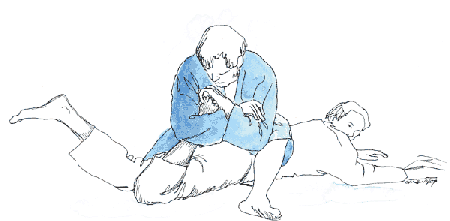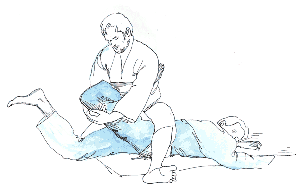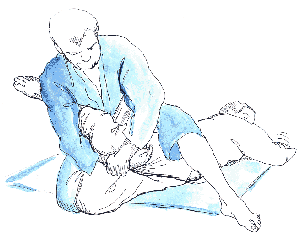|
Back to the Introduction
A complete list of tests and treatments will be available in the upcoming book Surviving Martial Arts. Tight Quads? And I Should Care Because . . . ?
Tight quads cause weakness, buckling,
improper tracking of the kneecap, grinding/crackling and pain
in ordinary daily life.
If you compete in wrestling, BJJ (Brazilian Jiu-Jutsu),
or Mixed Martial Arts / NHB events, tight quads can cost you the
match. Tight quads are very common and painful -- therefore
very common and useful for submission holds.
Rectus femoris is especially likely to be tight because
it crosses both the knee AND the hip and is rarely
fully stretched. If you can't pass the
Heel-To-Butt Test, you'll be a pushover for this leg lock and
need to tap out long before you should.
(Note: Leg locks like these are illegal in Judo competition which is
intended to allow maximum force with minimal danger of injury.
They are illegal precisely because they are so likely to injure
someone with tight, inflexible muscles. These, may, however, be seen when
judoka are "playing" and a flexible player will almost always be
less prone to injury than a tight, inflexible one!)
This lock stretches the quadriceps muscles (and the tibialis and
other extensor muscles of the ankle).
If the 3 vastus muscles are flexible, you may survive this lock
by flexing the hip. This maintains some slack in a tight rectus femoris.
(Flexing the hip won't matter to the vastii because they don't cross the hip).
What if your opponent flexes your knee and EXTENDS your hip?
In the picture below, the subject is on his stomach. Otherwise,
he's in exactly the same position as the subject on his back on
the table in the Heel-to-Butt Test.
Because of the trigger point near the hip, merely extending the hip
may be enough to produce extreme pain.
|
catalog | order form | mailing list | e-mail | home
www.round-earth.com


